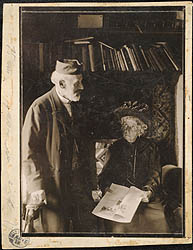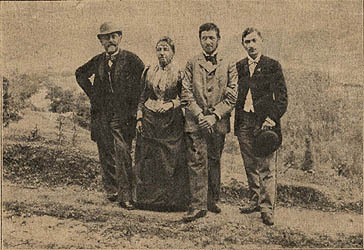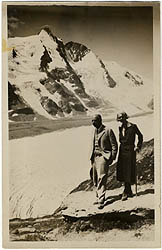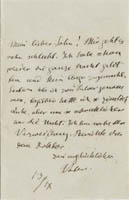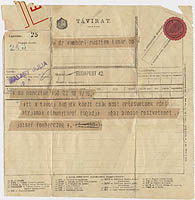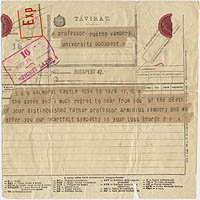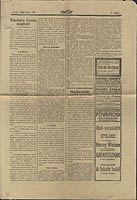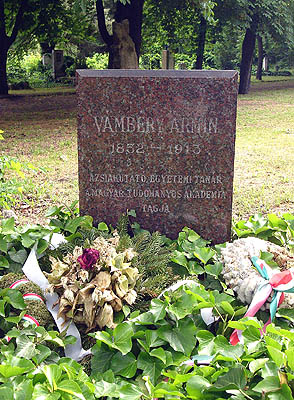 Ármin Vámbéry
was born in Szentgyörgy in Upper Hungary (today Svätý Jur in Slovakia), in a Jewish family of Southern German
origins. Since at the time the issuance of birth certificate was not required for
the Jewish population, the exact date of his birth went into oblivion. He
himself later put it on 19 March 1832. The name of the family was actually
Bamberger, referring to their Bavarian origins, which was used in the version Wamberger by his father.
Ármin Vámbéry used this name, as well as his German first name (Hermann)
converted into a Hungarian form.
1
His father, a scholar of the Jewish traditions and of the Talmud, fell victim to
the first major cholera epidemic in Hungary in 1831-1832, so that he could not
live to see the birth of his son.
Ármin Vámbéry
was born in Szentgyörgy in Upper Hungary (today Svätý Jur in Slovakia), in a Jewish family of Southern German
origins. Since at the time the issuance of birth certificate was not required for
the Jewish population, the exact date of his birth went into oblivion. He
himself later put it on 19 March 1832. The name of the family was actually
Bamberger, referring to their Bavarian origins, which was used in the version Wamberger by his father.
Ármin Vámbéry used this name, as well as his German first name (Hermann)
converted into a Hungarian form.
1
His father, a scholar of the Jewish traditions and of the Talmud, fell victim to
the first major cholera epidemic in Hungary in 1831-1832, so that he could not
live to see the birth of his son.
The willpower and diligence of the widow mother could only temporarily ease the
family’s great poverty, and when she remarried, they founded a new home in
Dunaszerdahely. Vámbéry considered this city as his official place of birth.
Since his childhood he lived in privation, and his sufferings were increased by
the fact that at the age of three he became lame of his right leg.
2
The little Ármin was an outstanding student since his first school years,
already in the Jewish school of Dunaszerdahely (now Dunajská Streda, Slovakia) and then in the Protestant
elementary scohol, where he made his first steps on the way of detachment from
the Jewish Orthodox environment and traditions. He worked a private tutor
throughout his youth, since the age of ten, when his mother, to alleviate the
bread-and-buter worries of the five-children family, sent him as an
apprentice to a tailor, to whose son he taught Hebrew. Later he was a tutor in Csallóköznyék
(now Nekyje na Ostrove, Slovakia) at the local inkeeper. He attended for two school years the
high school in Szentgyörgy, where he studied with excellent results, while undertaking occasional jobs and often suffering from hunger and from the meager
circumstances. Around the age of 14 he definitely broke with the Orthodox Jewish
religiosity, and this disillusionment made him sceptical with the dogmatic
confessions in general.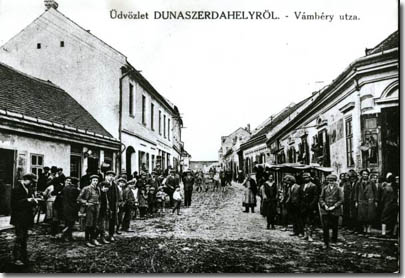 He attended the third to fifth grade in the Benedictine high school in Pozsony
(Bratislava), while earning his bread as a private tutor. The revolutionary
events of 1848 found him in Pozsony, and had a deep impact on him, instilling in
him a patriotism and an anti-Russian feeling persisting throughout his life,
which he led back to the sight of the Tsarist troops marching in the city in
1849.
He attended the third to fifth grade in the Benedictine high school in Pozsony
(Bratislava), while earning his bread as a private tutor. The revolutionary
events of 1848 found him in Pozsony, and had a deep impact on him, instilling in
him a patriotism and an anti-Russian feeling persisting throughout his life,
which he led back to the sight of the Tsarist troops marching in the city in
1849.
Mainly for financial reasons he abandoned his plan to continue the sixth
grade in the Protestant high school in Pozsony. His further life was dominated
by self-study. Due to an insatiable thirst for knowledge and a love for books, he
gained an extraordinary literary education, although he himself was well aware
of the unevenness of his knowledge as a necessary consequence of self-study. He
first worked as a tutor in Máriavölgy (now Marianka, Slovakia), and then finally left
Bratislava to work for a long period at a smallholder family in Zsámbokrét (now ®abokreky,
Slovakia).
His income, however, was not enough to settle his debts with his Pozsony school,
so he was never able to take out his high school certificate. In hindsight he
often blamed himself for this “egregious folly” and “sinful negligence”.
3
In 1851 he went to Pest, where he worked for a couple of years primarily as a private tutor,
in the midst of the daily problems of self-support and privation. At the time he already had a command of seven languages: at the age of
eight he could read and write in German, Hungarian and Hebrew, and later he
learned Latin, Slovak, French and Italian. He usually received his commissions
through an intermediary, a certain Mr. Mayer, whose headquarters was in the
Orczy House in Pest, which also functioned as a “teachers’ market”.
4
He had temporary works in several parts of the country. In the Slavonian Kutyevó
(now Kutjevo, Croatia), where he almost lived in prosperity after his previous
vicissitudes, he also learned Croatian.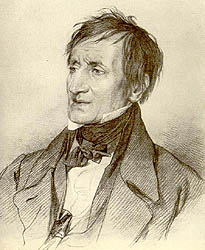 Then he continued the series of his Slavic languages by starting to learn
Russian. He said the “first and last love” of his life also flamed up in Kutyevó:
the 19-year old boy fed gentle and unrequited feelings toward his student Emília,
the sixteen-year old daughter of his host. Vámbéry himself attributed to this
that after one and half year of service he was dismissed on the initiative of
the worrying mother. He paid a short visit to his family in Dunaszerdahely, then
his increasing confidence, nourished by his talent in languages, drove him to
search for a job in Vienna. However, due to the absence of necessary
recommendations and lack of experience in official life, he was disappointed in
the imperial city. Yet, his Vienna excursion enriched him an important
experience, which was decisive for the rest of his career: he had an occasion to
make acquaintance with Baron Joseph von
Hammer-Purgstall (1774-1856), the renowned researcher of Turkish history and
literature, who encouraged Vámbéry to deepen his Turkish studies. Returning to
Pest, he rented a bed in Dob Street, and continued to support himself as a
private tutor, mainly with English and French lessons. In this period of much
privation he intensively continued his linguistic studies. As he wrote in his
memoirs: “in this period of my teacher’s life I devoted ten or twelve hours
daily with full zeal to my linguistic studies”.
5
He became a regular reader of the University Library. Via one of the library’s
officers, a former university professor of Hungarian language and literature,
Then he continued the series of his Slavic languages by starting to learn
Russian. He said the “first and last love” of his life also flamed up in Kutyevó:
the 19-year old boy fed gentle and unrequited feelings toward his student Emília,
the sixteen-year old daughter of his host. Vámbéry himself attributed to this
that after one and half year of service he was dismissed on the initiative of
the worrying mother. He paid a short visit to his family in Dunaszerdahely, then
his increasing confidence, nourished by his talent in languages, drove him to
search for a job in Vienna. However, due to the absence of necessary
recommendations and lack of experience in official life, he was disappointed in
the imperial city. Yet, his Vienna excursion enriched him an important
experience, which was decisive for the rest of his career: he had an occasion to
make acquaintance with Baron Joseph von
Hammer-Purgstall (1774-1856), the renowned researcher of Turkish history and
literature, who encouraged Vámbéry to deepen his Turkish studies. Returning to
Pest, he rented a bed in Dob Street, and continued to support himself as a
private tutor, mainly with English and French lessons. In this period of much
privation he intensively continued his linguistic studies. As he wrote in his
memoirs: “in this period of my teacher’s life I devoted ten or twelve hours
daily with full zeal to my linguistic studies”.
5
He became a regular reader of the University Library. Via one of the library’s
officers, a former university professor of Hungarian language and literature,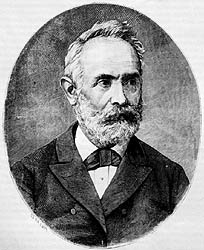 János
Garay (1812-1853)
he became acquainted with the renowned national poet Mihály Vörösmarty (1800-1855)
and later Count József Teleki (1790-1855),
the founder of the Academy Library. His one-year commission in Kecskemét, where
he worked at the Schweiger family, proved decisive in his Oriental studies.
There he began to intensively study Turkish and Arabic, and it was a great help
to him that he could borrow Arabic manuals from Mór Ballagi (1815-1891), the
professor of the local Protestant high school. Ballagi called on him also the
attention of the renowned author Count Zsigmond Kemény (1814-1875).
János
Garay (1812-1853)
he became acquainted with the renowned national poet Mihály Vörösmarty (1800-1855)
and later Count József Teleki (1790-1855),
the founder of the Academy Library. His one-year commission in Kecskemét, where
he worked at the Schweiger family, proved decisive in his Oriental studies.
There he began to intensively study Turkish and Arabic, and it was a great help
to him that he could borrow Arabic manuals from Mór Ballagi (1815-1891), the
professor of the local Protestant high school. Ballagi called on him also the
attention of the renowned author Count Zsigmond Kemény (1814-1875).
He continued learning Eastern languages during the teacher’s positions held in
the estates of Csévpuszta near Monor and Pótharaszt. He practised the Arabic
language mainly by reading the Quran, and he got acquainted with the excerpts of
Persian literature from Vuller’s anthology. The last stop of his teacher’s
career was Csetény in Veszprém county.
The realization of his long cherished dream, the Oriental journey appeared close
in 1856, mainly due to the support of Baron József Eötvös (1813-1871). Eötvös,
who received Vámbéry on the recommendation of János Garay and Zsigmond Kemény,
recommended the talented youngster to Pál Hunfalvy (1810-1891), the chief
librarian of the Academy, and he to the president of the Academy, József Teleki.
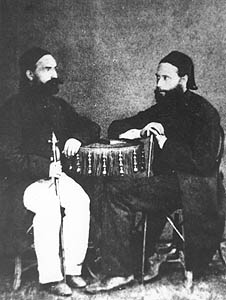 In March 1857 he set out to his first Oriental journey, with Istanbul as its
aim. In the capital of the Ottoman Empire he soon became acquainted with several
members of the Hungarian emigration of 1848, including Dániel Szilágyi
(1830-1885), who run an antiquarian bookshop in the Galata district. After his
death, the valuable Turkish, and to a lesser extent Arabic and Persian
manuscripts went over to the Hungarian Academy, due to the intervention of Ármin
Vámbéry.
In March 1857 he set out to his first Oriental journey, with Istanbul as its
aim. In the capital of the Ottoman Empire he soon became acquainted with several
members of the Hungarian emigration of 1848, including Dániel Szilágyi
(1830-1885), who run an antiquarian bookshop in the Galata district. After his
death, the valuable Turkish, and to a lesser extent Arabic and Persian
manuscripts went over to the Hungarian Academy, due to the intervention of Ármin
Vámbéry.
Through the patronage of his fellow countrymen, and not least to his own
exceptional interprersonal skills, as well as to his services as a language
teacher, Vámbéry became well acquainted with influential governmental circles,
and he could now develop his theoretical knowledge of language in the practice.
During his four-year stay in Istanbul, he not only had an excellent knowledge of
the peculiarities of spoken Ottoman Turkish, but also gained in-depth experience
of the habits, social conventions and behavior patterns of the Muslim-Turkish
world. At the house of Husein Daim Pasha he received the name Reshid, which he
proudly used in the Muslim world from then on.
His commitment to the research of the origin of the Hungarians and of the
Hungarian language solidified during his stay in Istanbul. In 1861 he was
elected a corresponding member of the Hungarian Academy. Returning to Pest, he
began preparations for his major enterprise, the second Eastern – Central Asian
– journey, to which he had the support of the president of the Academy, Emil
Dessewffy, and the majority of the learned society. In his farewell speach of 29
July 1861 he informed the Academy on his objectives. As he said, “we are looking
for linguistic truth, instead of the ancient homeland of the Hungarians”.
Vámbéry was the last European traveler to visit before the Russian invasion, in
1862-1863, the khanates of Central Asia, and to return home safely from his trip
leading through Khiva, Bokhara and Samarkand. His survival was mainly due to his
convincingly acting the role of the Sunni literate and dervish,
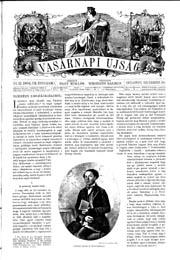 which assumed
not only an exceptional linguistic and cultural preparedness, but also an
incredible self-control and adaptive skills.
This is how he managed to avert the
dangers posed by this environment, jealous of its independence in the pression
of the Russian and British spheres of interest, and hostile to all European and
non-Muslim strangers.
which assumed
not only an exceptional linguistic and cultural preparedness, but also an
incredible self-control and adaptive skills.
This is how he managed to avert the
dangers posed by this environment, jealous of its independence in the pression
of the Russian and British spheres of interest, and hostile to all European and
non-Muslim strangers.
The experiences gained during his travels were a capital to him which defined
his further career, in linguistic, ethnographic, and even geographic terms. His
observations also attracted the interest of the great powers interested in the
region, Russia and Great Britain. Vámbéry, returning home in 1864, remembered
with bitter disappointment his reception in Hungary, which he attributed to the
political atmosphere preceding the Austro-Hungarian Compromise in 1867.
6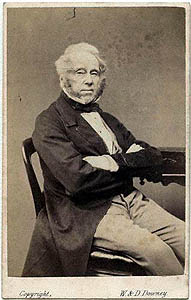 Vámbéry, a self-made man, who, emerging from extraordinary difficulties by his
power of will and ambitions, and was forced to develop his talent through
self-education, by bypassing the traditional educational system, and even so
providing exceptional performances, found in Great Britain the coveted honor,
which in Hungary was unachievable to him. After a month’s stay in Pest, he
went to London, where he was received with the appreciation and respect due to
the discoverer. In 1864 he published in London his English-language travel book
Travels in
Central Asia. He felt at home in the keen interest surrounding him. He held
a series of lectures, including in the Royal Geographical Society, and was
presented to Prime Minister Lord Palmerston. Although in the following years he
returned several times to Great Britain, and his books and articles were
published in many countries of the continent, nevertheless it never occurred to
him to turn his back to Hungary.
Vámbéry, a self-made man, who, emerging from extraordinary difficulties by his
power of will and ambitions, and was forced to develop his talent through
self-education, by bypassing the traditional educational system, and even so
providing exceptional performances, found in Great Britain the coveted honor,
which in Hungary was unachievable to him. After a month’s stay in Pest, he
went to London, where he was received with the appreciation and respect due to
the discoverer. In 1864 he published in London his English-language travel book
Travels in
Central Asia. He felt at home in the keen interest surrounding him. He held
a series of lectures, including in the Royal Geographical Society, and was
presented to Prime Minister Lord Palmerston. Although in the following years he
returned several times to Great Britain, and his books and articles were
published in many countries of the continent, nevertheless it never occurred to
him to turn his back to Hungary.
His oeuvre evolving from the mid-1860s was extremely diverse. The original
objective and legacy of his Oriental journey was primarily linked to the
research of Hungarian origins, and in this field he made his most important
achievements in linguistics – more specifically, in Turkish philology – and
ethnography, but he was also known as the author of historical works. He was
considered not only a philologist, but also as a traveler and a strategic
analyst. Due to the different focus on the various aspects of his oeuvre, he
enjoys a different evaluation and appreciation in Hungary and in Europe,
especially in England.
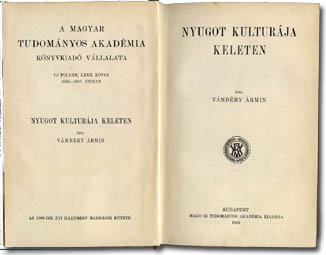 At
home he is still regarded as a researcher of the Hungarian origins, while in
England as a political writer.
7
His latter activity is attached to a further important thread of his career,
which got stronger since the 1880s. Due to his exceptionally far-reaching
relations, and his confidential relationship with British governmen circles and
Sultan Abdülhamid II
(1876-1909), he also benefited from his experiences as an intermediary and
advisor of foreign politics. In accordance with his conviction formed in his
youth, he turned his knowledge to the benefit of the British Empire, which he
considered as the depositary of progress and civilization, and to the prevention
of the expansionist ambitions of Tsarist Russia, which he rejected because of
his impressions of 1849, when the army of this latter seriously contributed to
the oppression of the Hungarian war of independence. On the other hand, he was
bitterly aware, that in the Austro-Hungarian Monarchy he was completely ignored
as an expert of foreign policy. Vámbéry’s relations to the subject of his
research can be recognized from the political opinions and world view exposed in
his works. His statements clearly contradict his enthusiasm for the East and
Islam, and present him as a committed supporter of Western civilization, a real
“imperialist” (A Nyugot kultúrája Keleten [The culture of the West in the
East]).
At
home he is still regarded as a researcher of the Hungarian origins, while in
England as a political writer.
7
His latter activity is attached to a further important thread of his career,
which got stronger since the 1880s. Due to his exceptionally far-reaching
relations, and his confidential relationship with British governmen circles and
Sultan Abdülhamid II
(1876-1909), he also benefited from his experiences as an intermediary and
advisor of foreign politics. In accordance with his conviction formed in his
youth, he turned his knowledge to the benefit of the British Empire, which he
considered as the depositary of progress and civilization, and to the prevention
of the expansionist ambitions of Tsarist Russia, which he rejected because of
his impressions of 1849, when the army of this latter seriously contributed to
the oppression of the Hungarian war of independence. On the other hand, he was
bitterly aware, that in the Austro-Hungarian Monarchy he was completely ignored
as an expert of foreign policy. Vámbéry’s relations to the subject of his
research can be recognized from the political opinions and world view exposed in
his works. His statements clearly contradict his enthusiasm for the East and
Islam, and present him as a committed supporter of Western civilization, a real
“imperialist” (A Nyugot kultúrája Keleten [The culture of the West in the
East]).
An important landmark on his career as a Hungarian scholar was the university
cathedra. In 1865 he was appointed instructor at the Faculty of Eastern
Languages of the Pest University. From 1868 he was an extraordinary, from 1870
an ordinary professor, and until his retirement in 1905 he taught the next
generation of Hungarian Oriental studies.
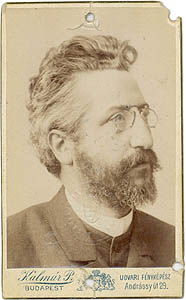 Among
his students we can highlight the Iranologist
Sándor Kégl (1862-1920), the
internationally acknowledged Islam scholar Ignác Goldziher (1850-1921), the
adventurous traveler Gyula Germanus (1884-1979) and József Thúry (1861-1906) who
followed Vámbéry at the head of the department, but died at an early age. In 1876
he was elected an ordinary member of the Academy, in 1893 he became a honorary
and in 1903 an ordinary member of the board of directors. He was a founding
member, and in 1889-1890 president of the Hungarian Geographic
Society. An important expression of his foreign reputation was the honorary
doctorate of the Dublin University in 1884. Nevertheless, he himself summed his
scientific work with the following words: “I’m anything else but a scholar, and
I could not even become that, in the known sense of this word. To become a
scholar, I did not have the necesesary qualifications, education and temper.”
8
Among
his students we can highlight the Iranologist
Sándor Kégl (1862-1920), the
internationally acknowledged Islam scholar Ignác Goldziher (1850-1921), the
adventurous traveler Gyula Germanus (1884-1979) and József Thúry (1861-1906) who
followed Vámbéry at the head of the department, but died at an early age. In 1876
he was elected an ordinary member of the Academy, in 1893 he became a honorary
and in 1903 an ordinary member of the board of directors. He was a founding
member, and in 1889-1890 president of the Hungarian Geographic
Society. An important expression of his foreign reputation was the honorary
doctorate of the Dublin University in 1884. Nevertheless, he himself summed his
scientific work with the following words: “I’m anything else but a scholar, and
I could not even become that, in the known sense of this word. To become a
scholar, I did not have the necesesary qualifications, education and temper.”
8
Ármin
Vámbéry was one of the stimulators of the debates on the origin of the
Hungarians, which, due to their precedents, constituted a series of scientific
clashes imbued with politics, and are known in the history of science as
the “Ugro-Turkic war”.
9 The series of theoretical battles between the scholars asserting
the Finno-Ugric origin of the Hungarians on the one hand, and the Turkish one on
the other, was opened by Vámbéry’s 1882 study “A magyarok eredete. Ethnologiai tanulmány”
[The origin of the Hungarians. Ethnological study]. The “Ugric camp” was led by
the former friend of Vámbéry, József Budenz (1836-1892), who earlier also leaned
towards the Turkish kinship, as well as by Pál Hunfalvy and József Szinnyei (1830-1913).
Vámbéry’s views were shared by Henrik Marczali (1856-1940) and József Thúry. The
broad social interest surrounding the scientific discourse is shown by the fact
that the developments were reported on a regular basis in the daily newpapers.
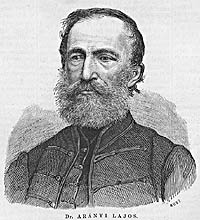 Vámbéry,
who wrote extremely much and very colorfully in a myriad of genres, and who even
shared many little details of his private life with his readers, very succintly
said on his family life: “A home, a «sweet home» in the English sense of
this word was not given to me by the fate, because my wife, this e szó angol értelmében
szerény mértékben sem adott nekem a sors, mgood-natured and excellent woman, was
very ill for many years, and had it not been for the beautiful boy, whom she
gifted to me, and who later became an excellent scholar, I could have never
spoken about domestic happiness. But my library and study room was a strong
fortress of my earthly happiness; a fortress, from which I could see the three
continents, and from which, through the regular correspondence with various
countries of Europe, Asia and America, I could maintain my personal and academic
connections.”
10
We know very few about his marriage. In the absence of an official document, we
have to rely on the 1868/6 issue of Vasárnapi Újság [Sunday News]. Here,
in the Supplement we have an one-sentence notice: “Our distinguished traveler
Ármin Vámbéry was engaged with Kornélia, the daughter of university professor
Dr. Lajos Arányi.”
11
Vámbéry,
who wrote extremely much and very colorfully in a myriad of genres, and who even
shared many little details of his private life with his readers, very succintly
said on his family life: “A home, a «sweet home» in the English sense of
this word was not given to me by the fate, because my wife, this e szó angol értelmében
szerény mértékben sem adott nekem a sors, mgood-natured and excellent woman, was
very ill for many years, and had it not been for the beautiful boy, whom she
gifted to me, and who later became an excellent scholar, I could have never
spoken about domestic happiness. But my library and study room was a strong
fortress of my earthly happiness; a fortress, from which I could see the three
continents, and from which, through the regular correspondence with various
countries of Europe, Asia and America, I could maintain my personal and academic
connections.”
10
We know very few about his marriage. In the absence of an official document, we
have to rely on the 1868/6 issue of Vasárnapi Újság [Sunday News]. Here,
in the Supplement we have an one-sentence notice: “Our distinguished traveler
Ármin Vámbéry was engaged with Kornélia, the daughter of university professor
Dr. Lajos Arányi.”
11
Vámbéry mentioned his wife only once in his memoirs, and did not dedicate to her
any of his works. It seems that emotions played little role in the marriage, but
more so the possibility of social progress. The father-in-law,
12
Dr. Lajos Arányi (born Lohsteiner) (1812-1887) 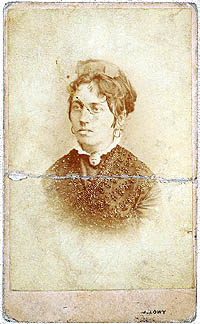 was a highly respected professor
of medicine, whose career has some similarities with that of Vámbéry.
Lohsteiner, born in a Transylvanian Lutheran Saxon family, orphaned early, and
was brought up by his uncle. Having graduated in the Piarist high school in
Buda, his interest turned to medicine. He also developed a strong Hungarian
identity, and changed his family name into a Hungarian-sounding one before 1848.
In 1844 he became extraordinary professor of pathology at the University of
Pest. He took part in the war of independence as a camp doctor. In 1858 he
became a corresponding member of the Hungarian Academy of Sciences, and in July
1861 he was appointed ordinary teacher of pathology at the Royal University of
Pest.
was a highly respected professor
of medicine, whose career has some similarities with that of Vámbéry.
Lohsteiner, born in a Transylvanian Lutheran Saxon family, orphaned early, and
was brought up by his uncle. Having graduated in the Piarist high school in
Buda, his interest turned to medicine. He also developed a strong Hungarian
identity, and changed his family name into a Hungarian-sounding one before 1848.
In 1844 he became extraordinary professor of pathology at the University of
Pest. He took part in the war of independence as a camp doctor. In 1858 he
became a corresponding member of the Hungarian Academy of Sciences, and in July
1861 he was appointed ordinary teacher of pathology at the Royal University of
Pest.
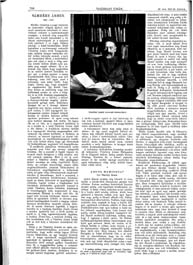 No doubt that the professor of pathology, who was also interested in Oriental
languages and was a keen amateur historian and archaeologist, could be familiar
with Vámbéry, either from the Academy, or from his public lectures, or even from
the elite salons of Pest, where Vámbéry was a welcome and frequent guest.
No doubt that the professor of pathology, who was also interested in Oriental
languages and was a keen amateur historian and archaeologist, could be familiar
with Vámbéry, either from the Academy, or from his public lectures, or even from
the elite salons of Pest, where Vámbéry was a welcome and frequent guest.
In early 1868, when Ármán Vámbéry married Kornélia Rechnitz-Arányi, social
prestige, the similar world view, the common passion for the East and for
Hungary, as well as the mutual appreciation (since Professor Arányi must have
appreciated the kinship with the by already famous Vámbéry) probably played
important role in the marriage.
It seems that Kornélia rarely followed her husband to his frequent journeys, but
maybe this was due to her constant illness. A proof for that may be that in his
older age he regularly took her to the medicinal waters of Mühlbach in Tirol,
where he used to go to on vacation. After her death in 1918, Kornélia was buried
in the crypt of the Arányi family.
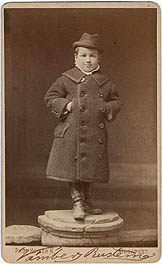 One
boy was born from their marriage. It was probably also due to the wish to escape
from the very strong influence of the father that Rusztem Vámbéry (1872-1948)
was taken away very far from the vocation of linguist and Orientalist dreamt for
him: he became a renowned jurist, known not only as a university professor and
judge of the Court of Appeal, but also as the author of several works of
jurisprudence, and an outstanding personality of Hungarian criminology. He was
the attorney of the poet Attila József and the Communist party leader Mátyás
Rákosi. In addition, he was a committed radical politician, an active freemason,
one of the strongest critic of the interwar Horthy regime, and as such, one of
the most frequently observed figures in the files of the secret police, later an
exile politician. In 1947 and 1948 he became Ambassador of Hungary to
Washington. He ended his life there.
One
boy was born from their marriage. It was probably also due to the wish to escape
from the very strong influence of the father that Rusztem Vámbéry (1872-1948)
was taken away very far from the vocation of linguist and Orientalist dreamt for
him: he became a renowned jurist, known not only as a university professor and
judge of the Court of Appeal, but also as the author of several works of
jurisprudence, and an outstanding personality of Hungarian criminology. He was
the attorney of the poet Attila József and the Communist party leader Mátyás
Rákosi. In addition, he was a committed radical politician, an active freemason,
one of the strongest critic of the interwar Horthy regime, and as such, one of
the most frequently observed figures in the files of the secret police, later an
exile politician. In 1947 and 1948 he became Ambassador of Hungary to
Washington. He ended his life there.Ármin Vámbéry remained active until the last day of his life, he wrote and worked. However, the first and last illness of his life, the hardening of his heart arteries proved fatal. After a vacation, from where he returned on 20 August 1913, his condition began to rapidly deteriorate. On 15 September he died in Budapest. He died without a will. His only request was to have a simple Protestant burial without funeral orations and songs, and not to be accompanied to his last journey from the University or the Academy. His tomb is in the Kerepesi Street cemetery.

